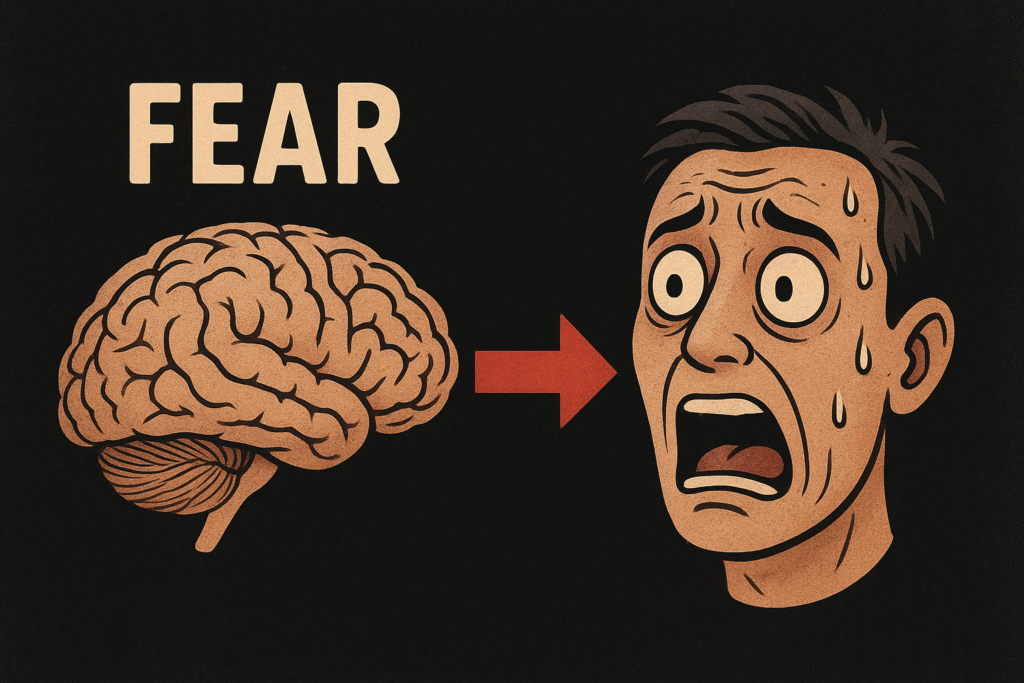Fear and the Brain: Understanding the Science Behind Anxiety
There’s a moment late at night when everything is calm, but your heart beats to race without alert. Your mind spins, your breathing is fast, and it feels like your mind turned against you, and I have felt it too. Many of us. It’s in these moments that we understand just how true the powerful relationship between fear and the brain is.
Anxiety is not simple in your head. It’s your mind, body, and emotions work combined. Sometimes overload. When you learn how fear is a real function in your brain, you regain your control. The aim is not just shut fear down but to understand it, not by silencing fear but by learning how it works.
The Cellular Memory of Fear
Understanding the fear and the brain, we have to back in time. Thousands of years ago. Fear was core for survival. When faced with pressures, the brain releases powerful chemicals to fight to fight the brain activates stress hormones to ready the body for action.
For early humans the fight-or-flight response was a gift; it meant survival. The amygdala, our inner danger detector. The problem is modern life really is for Ice age hunters. Our brain still tones the alarm for threats that only exist in the mind.
Your brain does not know what is real between physical danger and emotional stress. When that system stays activated for too long. That where long-term anxiety is a system stuck on high alert.
What Happens in the Brain When You are Afraid
When you are struggling with anxiety, your amygdala sends a sound signal to the rest of your brain. The hypothalamus releases stress hormones that make your body stress regularly, increase your heart rate, tighten your chest, and overthink your thoughts.
As this unfolds, the prefrontal cortex—the logical part of your brain tries to calm things down. But when fear is too strong, the emotional brain floods the rational one.
That’s why anxiety feels out of control because, in many ways, it is. Your brain adjusts into survival mode.
Learning about fear and the brain means noticing that you are not weak or broken. You are human, and your brain is just trying to save you even if it misfires.
The Connection Between Anxiety, Sleep, and Control
For me, anxiety has always hit hardest at night. I did lie awake for hours, my overthinking fear of losing control. The more I tried to force myself to relax, the more tense I became.
Sleep and anxiety have a difficult relationship. When your brain’s fear centers are active, they make it nearly impossible to rest. This is why so many people with anxiety struggle with insomnia.
Medications like Ambien are many times prescribed to help people fall asleep when anxiety interferes. Ambien does not cure anxiety itself; it gives the body a chance to reset. Rest is essential for regulating fear and the brain—because without proper sleep, fear signals only grow louder.
It’s not about medication alone, though. It’s about balance finding ways to help your brain feel safe again.
Accepting Fear as a Part of Life
Fear will always be a part of life, and it’s okay. It saves us, guides us, and keeps us aware. The goal is not to take away fear but to understand it.
When you learn how fear and the brain work together, you begin to see that anxiety isn’t the enemy misunderstanding it is.
Healing starts when you stop judging your feelings and start listening to them it’s through therapy, mindfulness, or medications like Ambien and Xanax; you’re not giving up control, you are reclaiming it.
Because the real power lies not in silencing fear but in learning to live peacefully beside it.
The Gentle Healing of Mindful Presence
One of the most powerful lessons I have learned in my own anxiety travel is this: awareness changes learning.
When you notice what’s happening in your brain, you stop seeing yourself as crazy and start seeing the science behind your emotions. knowing fear and the brain allows you to part identity from experience. I feel restless instead of I am tired.
Practices like mindfulness, deep breathing, and grounding exercises help strengthen the frontal cortex teach it to overrule the amygdala’s false alarms. Over time, this rewires the brain to define stress differently.
Fear and the Flexible Brain
The most moving finding in brain science is neuroplasticity, the brain’s ability to change. It means that even if your anxiety feels lasting, it’s not.
Every calming moment, every healthy habit, and every therapy session slowly reforms fear and the brain connection. With time, your amygdala learns that not every trigger equals danger.
That’s hope, backed by science.
The Science of Calming Fear Naturally
Medication like Ambien and Xanax can save your life, but the truth is that it is only for the short-term; for long-term healing from change, the lifestyle and habit help to overcome the fear and the brain.
Passion Flower tea: This tea helped me sleep sometimes, making it easier to skip Ambien on lighter nights and helping me fall asleep well without overthinking.
Gentle structure and Routine: Anxiety rid me of fear of schedules. So I started following a soft routine of a morning walk and writing my thoughts before sleeping, and I do not use my phone after 9 p.m.
Therapy: Cognitive Behavioral Therapy (CBT) teaches practical ways to challenge overthinking thoughts.
The Role of Medication: Ambien and Xanax
Sometimes, the brain sound system becomes so restless that therapy and mindfulness alone are not enough. This is where medications like Xanax and Ambien can play a guiding role.
Xanax, for example, works by enhancing the effects of a neurotransmitter called GABA, which calms brain activity. When your amygdala is firing nonstop, Xanax can help quiet that inner storm.
Ambien, on the other hand, helps manage the sleep side of anxiety. It does not remove fear but by improving sleep, it helps regular the brain network responsible for emotional control.
For me, it was gentle to realize that sometimes the brain needs help. through medication or therapy, there’s no guilt in giving your mind the tools it needs to heal. Learning fear and the brain means manage that balance often requires support, and that’s okay.
Final Thoughts
The science of fear and the brain shows something both logical and inner—that we are complex beings with ancient instincts and modern emotions. Fear is not a flaw; it’s part of human life.
By learning how your brain answers to fear, you can start to guide anxiety with kindness, awareness, and power. You may not always control how you feel, but you can always choose how you answer, and that’s where real healing starts.

